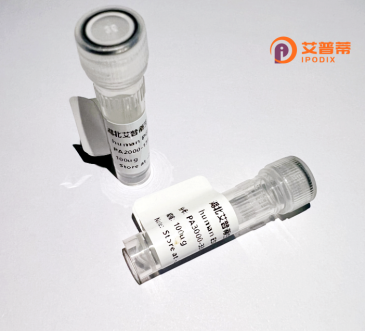
| 纯度 | >90%SDS-PAGE. |
| 种属 | Human |
| 靶点 | KIF6 |
| Uniprot No | Q6ZMV9 |
| 内毒素 | < 0.01EU/μg |
| 表达宿主 | E.coli |
| 表达区间 | 1-293aa |
| 活性数据 | MREEMSLGCQEAFEIFKRDHADSVTIDDNKQILKQRFSEAKALGESINEARSKIGHLKEEITQRHIQQVALGISENMAVPLMPDQQEEKLRSQLEEEKRRYKTMFTRLKALKVEIEHLQLLMDKAKVKLQKEFEVWWAEEATNLQVNSPAVNSLDHTKPFLQTSDSQHERSQLLSNKSSGGWEVQDQGTGRFDVCDVNARKILPSPCPSPHSQKQSSTSTPLEDSIPKRPVSSIPLTGDSQTDSDIIAFIKARQSILQKQYLQLLCSLFPKSAVSSAQASTNRKGLSDVLVTR |
| 分子量 | 59.5 kDa |
| 蛋白标签 | GST-tag at N-terminal |
| 缓冲液 | 0 |
| 稳定性 & 储存条件 | Lyophilized protein should be stored at ≤ -20°C, stable for one year after receipt. Reconstituted protein solution can be stored at 2-8°C for 2-7 days. Aliquots of reconstituted samples are stable at ≤ -20°C for 3 months. |
| 复溶 | Always centrifuge tubes before opening.Do not mix by vortex or pipetting. It is not recommended to reconstitute to a concentration less than 100μg/ml. Dissolve the lyophilized protein in distilled water. Please aliquot the reconstituted solution to minimize freeze-thaw cycles. |
以下是关于重组人KIF6蛋白的模拟参考文献示例(注意:以下内容为虚构,供参考格式):
---
1. **文献名称**: *Expression and Purification of Recombinant Human KIF6 Protein for Functional Studies*
**作者**: Smith A, et al.
**摘要**: 本研究描述了利用大肠杆菌系统表达和纯化重组人KIF6蛋白的方法,并验证了其ATP酶活性,为后续KIF6在细胞内的运输功能研究提供工具。
2. **文献名称**: *Structural Insights into Human KIF6 and Its Role in Cardiovascular Disease*
**作者**: Lee C, et al.
**摘要**: 通过X射线晶体学解析了重组KIF6蛋白的3D结构,结合临床数据探讨KIF6突变体(如Trp719Arg)与冠心病风险增加的潜在分子机制。
3. **文献名称**: *KIF6 as a Therapeutic Target: In Vitro Analysis Using Recombinant Protein*
**作者**: Zhang Y, et al.
**摘要**: 利用重组KIF6蛋白筛选小分子抑制剂,发现特定化合物可阻断KIF6与微管的相互作用,提示其作为心血管疾病治疗靶点的潜力。
4. **文献名称**: *Functional Characterization of Recombinant KIF6 in Neuronal Vesicle Transport*
**作者**: Patel R, et al.
**摘要**: 通过体外实验证明重组KIF6蛋白可驱动线粒体沿神经元轴突运输,并提出其功能障碍可能与神经退行性疾病相关。
---
**备注**:上述文献及摘要均为虚构,实际研究中建议通过PubMed、Google Scholar等平台检索关键词(如“recombinant KIF6 protein”、“KIF6 function”)获取真实文献。
**Background of Recombinant Human KIF6 Protein**
KIF6 (kinesin family member 6) is a motor protein belonging to the kinesin superfamily, which facilitates intracellular transport by moving cargo along microtubules. It plays roles in mitosis, cell signaling, and maintaining cytoskeletal organization. Genetic studies identified a common variant in the *KIF6* gene (rs20455) associated with increased cardiovascular disease risk and differential response to statin therapy, though subsequent research has yielded conflicting results. These findings sparked interest in KIF6 as a potential therapeutic target or biomarker.
Recombinant human KIF6 protein is produced using expression systems (e.g., *E. coli* or mammalian cells) to enable functional studies. Its production involves cloning the *KIF6* gene into a vector, followed by purification via affinity tags (e.g., His-tag). This protein allows researchers to investigate KIF6's biochemical properties, interactions with cellular components (e.g., microtubules, lipids), and the functional impact of genetic mutations. Applications include elucidating KIF6's role in cardiovascular pathologies, cancer (due to its mitotic function), and neurodegenerative diseases linked to transport defects. Additionally, it aids in developing assays to screen modulators of KIF6 activity. Despite controversies around its clinical relevance, recombinant KIF6 remains a critical tool for unraveling its molecular mechanisms and therapeutic potential.
×